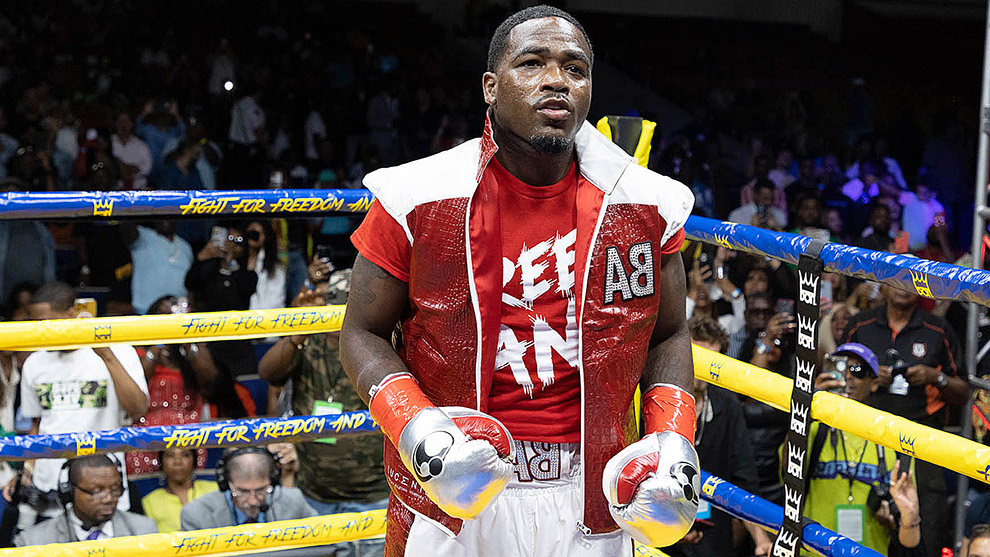THE day began with a video of a man trapped inside a suitcase, filmed by his girlfriend. The man struggled to breathe and pleaded for help while the woman spoke about teaching him a lesson. Viewers wondered how he could free himself without her assistance.
Unfortunately, he never managed to escape. He remained trapped in the case for 11 hours and died from lack of oxygen. As a result, the girlfriend was charged with murder. The video circulated on social media, allowing millions of people worldwide to watch it and voice their opinions in the comment section.
While scrolling later that morning, I came across another distressing video featuring Adrien Broner. He seemed to be trapped in a suitcase as well. Unlike the man in the previous video, Broner’s suitcase appeared to be open, suggesting he could have stood up or been helped out by others. However, neither Broner nor anyone else made an effort to set him free. It was a sad and regrettable spectacle, especially considering Broner’s slurred speech and clear drunkenness. He seemingly climbed into the case willingly and expected others to keep him trapped instead of allowing him to leave when he wanted to. When he finally cut the podcast short, the damage had already been done.
Frankly, considering Broner’s well-known issues and recent struggles with sobriety, he should not have been given the choice to participate in the podcast. There should not have been a situation where he could climb inside a case or pod in the first place. In an ideal world, he would have been far away from a podcast studio that day.
However, one could argue that public exposure is an integral part of Adrien Broner’s identity. He has lived his life in the public eye from the beginning, calling himself “The Problem” and later “About Billions.” Whether he was at his peak, resembling the next Floyd Mayweather, or after Marcos Maidana humbled him in 2013, Broner has always sought attention and flaunted his wealth and power. Now, with his fortunes dwindling, we witness the reverse process, with all the negative aspects of his life surfacing.
For boxing’s media, particularly podcasters, YouTubers, and click-baiting news bloggers, this is good news. They thrive on sensational content and follow the rules of the social media playground. To grab attention, they resort to childlike behavior, screaming, acting out, and craving attention. Having a drunk and troubled Adrien Broner as a guest in their shows, with a glass of alcohol in his hand, is a guaranteed way to generate clicks, listens, and interest. During the filming, he is encouraged to perform rather than being protected from himself.
Adrien Broner
However, there is a common misconception about addicts that they are surrounded by people who can positively influence, protect, or comfort them. In reality, these individuals, if they existed at all, are usually the first to leave. They are replaced by individuals who are more agreeable, easily influenced, and less inclined to say “no.”
I cannot speak about Broner’s support network, but if he had any decent people around him at the beginning of his rollercoaster ride, it is likely they have all fled by now. And rightfully so. Harsh as it may sound, it is his responsibility and his alone to seek help and address the extent of his problem, which none of us truly understand.
Instead of condemning Broner, viewing his recent downfall as karma, I prefer to see him as the latest example of what happens when a boxer’s life revolves solely around boxing. He was raised, trained, and conditioned to be a fighter. His relevance and respect are tied only to his boxing career. Without boxing, Broner is essentially a lost child, trying to navigate the tough streets of Cincinnati while wearing a diaper and sucking on a pacifier. Even at 33 years old, he must learn how to be a civilian and acquire basic life skills like a newborn. It’s tragic, especially considering that this cycle, the very thing that devastates Broner, will likely continue due to the number of children he has fathered.
The same can be said for Scott Fitzgerald of England, who is facing similar issues and receiving similar messages of support or criticism. Just like Broner, it is evident which messages come from individuals with experience in addiction and which come from those who would watch an addict in distress and simply tell them to get up and walk away. For these podcasting friends and supporters, addiction is merely a game. However, for the loved ones of these fighters, it is an entirely different story.
Now, you may ask, “Where are these loved ones?” Unfortunately, when someone reaches rock bottom, they are often beyond the point of being influenced or comforted by their loved ones, no matter how close they may be. The attempts to help have likely been rejected and met with frustration. Addicts do not maintain healthy relationships; they hold others hostage. Sadly, by participating in a podcast that sought to exploit him at his lowest point, Adrien Broner may have experienced a taste of his own medicine this week.
